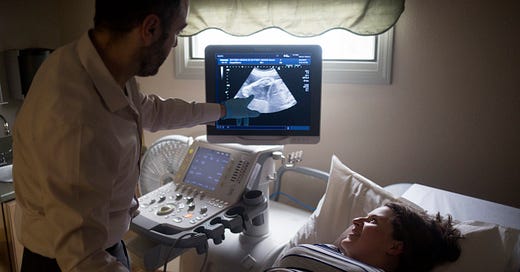
The Booming—and Not Entirely Trustworthy—Business of Prenatal Genetic Testing
Congress might soon pass legislation that would allow the FDA to rein in the industry’s excesses.
During the first weeks of pregnancy, it has become commonplace for women to undergo a battery of screening tests through which doctors can not only determine the gender of the unborn child but also identify various genetic disorders. Since it first became commercially available in 2011, noninvasive prenatal testing (NIPT), when a fetus’s DNA is examined by using a blood sample drawn from the expectant mother, has been employed to detect disorders. Down syndrome, for example, can be identified with a 99 percent accuracy rate. It is now rare for parents to learn their child has Down syndrome only after the baby is born.
But in recent years, with the success of accurately detecting conditions like Down syndrome, manufacturers have begun to suggest to doctors that they should order testing for far less common conditions, such as DiGeorge syndrome, Cri-du-chat syndrome, and Prader-Willi and Angelman syndromes. There was one main problem with this development. Among rare conditions, the accuracy rate of testing can be wrong—staggeringly wrong—from between 81 and 93 percent of the time.
“The tests are less reliable because they are examining more rare conditions,” says Liz Richardson, director of the health care products project at the Pew Charitable Trusts. “In fact, the more rare the condition is the less likely the testing is to be accurate.” The resulting conundrum is obvious: How can a woman make decisions that may affect her pregnancy with tests that, in some cases, are wrong the vast majority of the time?
The emerging controversy surrounding the testing was documented in a New York Times exposé on January 1. “In just over a decade,” the Times reported, “the tests have gone from laboratory experiments to an industry that serves more than a third of the pregnant women in America, luring major companies like Labcorp and Quest Diagnostics into the business.” Testing worked well at first on common disorders—companies noted the success identifying Down syndrome—but “as manufacturers tried to outsell each other, they began offering additional screenings for increasingly rare conditions.” When they did, the accuracy rates of those tests plummeted.
Such developments can have real-life consequences. Consider Yael Geller. The Times reported that a NIPT screening detected her unborn child had a defective chromosome, which could have produced various medical problems if the child was born, so the expectant mother considered terminating her pregnancy. However, when her doctor performed follow-up tests, which involved extraction of a sample of her placenta using a needle, the first test proved to be a false positive. Geller, thankfully, had not relied on the initial test to determine the fate of her unborn child or she may have aborted a perfectly healthy baby.
So why are companies conducting these unreliable tests? Simple: profits. By adding a panel of tests for rarer conditions to the basic (highly accurate) panel, a company can double the amount an insurer will pay. A basic panel of tests costs an average of $695, according to the Times; an expanded panel brings the fee to $1,349. “There are reasons why you’d screen someone for Down syndrome because of risk factors” such as maternal age, says Michelle Kuppersmith, executive director of Campaign for Accountability, a Washington-based watchdog group, “whereas for the more rare conditions there is no risk. These companies can make more money because they can have more tests done.”
Senator Michael Bennet, a Democrat of Colorado, has been working on issues regarding testing for the better part of a decade. “Today more than ever,” Bennet says, “patients rely on diagnostic tests to make important decisions about their health care with their doctor, and they rightfully believe that these tests should accurately inform those choices.” That, unfortunately, is not always the case.
One company that has been active in NIPT screening for genetic disorders, known in the industry as microdeletions, is Natera, a medical technology company in Austin, Texas, that describes itself as a “global leader in cell-free DNA testing.” According to the Times, the company ran 400,000 tests for DiGeorge syndrome in 2020, deemed a “rare disorder” by the Center for Rare Diseases, even though there was an 81 percent chance that any given positive result was wrong. And this is just one rare disorder for which the company is running tests.
The Times noted that while Natera had done well with basic testing, conducting two million screenings for Down syndrome over the last nine years, it was in fact screenings for microdeletions that company management wanted to trumpet. “This is a really significant moment for the microdeletions business,” Steve Chapman, Natera’s CEO, said to investors in early 2021. Should additional insurance companies begin to pay for more microdeletion testing, he said, the prospects for profits were “enormous.”
In a letter to the Securities and Exchange Commission dated January 14, Kuppersmith observed that Natera’s website contained descriptive phrases about the company like “the most accurate non-invasive prenatal testing on the market,” “trusted resource,” and “evaluated in 23 peer-reviewed publications in more than 1.3 million pregnancies.” However, no mention was made of the Times investigation of microdeletion disorders such as DiGeorge and Prader-Willi syndromes that found results “are incorrect approximately 85% of the time,” prompting one industry insider to call the exploitation of the microdeletion sector “purely a marketing thing.”
Because of overstated public claims and because Natera’s SEC filings “include misleading statements concerning the accuracy of its genetic tests in revealing genetic abnormalities,” Kuppersmith argued in her letter that “it is incumbent upon the SEC to investigate whether Natera knowingly overstated the accuracy of its NIPT to the detriment of its shareholders.” As it happens, Natera was recently found liable for false advertising. CareDx, a California medical company catering to transplant patients and caregivers, announced earlier this month that it had “won its false advertising case against Natera as a jury found that Natera intentionally and recklessly misled the transplant community by deliberately engaging in false advertising in the promotion and marketing of its Prospera kidney transplant rejection assessment test.” Compensatory and punitive damages against Natera totaled $44.9 million.
Of course, Natera is not the only company exploiting microdeletions; it is merely one in a rapidly growing sector. And these companies are not the only ones to court controversy in the blood-screening market. The most notorious case in this relatively new field of medical science is Theranos, the health tech company founded by Elizabeth Holmes that made such extravagant claims about its blood testing (it maintained that more than a thousand tests could be run on a single small blood sample) that, following a federal investigation, Theranos was shut down and Holmes was convicted of fraud. The scandal was the subject of John Carreyrou’s bestselling book Bad Blood and has resulted in a Hulu miniseries and a forthcoming movie.
The government agency that prosecuted Holmes was the SEC, not the Food and Drug Administration. That’s because the FDA does not have jurisdiction over blood and genetic testing, so the SEC was forced to step in to rectify an obvious problematic situation. “Theranos was marketing in a completely inaccurate way,” says a Democratic Senate staffer. “The FDA would have had the power to catch this much earlier in the process. But at the end of the day the Holmes case was based on SEC requirements. [Federal prosecutors] were not even going after safety and efficacy.”
But all of that may be about to change. A new bill, sponsored in the U.S. Senate by Bennet and Richard Burr of North Carolina, a Republican, and in the House of Representatives by Diana DeGette of Colorado, a Democrat, and Larry Bucshon of Indiana, a Republican, addresses a range of issues concerning medical testing, from COVID testing to genetic testing that would include microdeletions. Entitled the Verifying Accurate Leading-Edge IVCT Development Act—the VALID Act—the bill would give the FDA regulatory power over both the safety and efficacy of genetic testing and the truthfulness with which the testing is marketed.
And, if some current bureaucratic maneuvering is successful, the bill may be passed sooner rather than later—an unusual occurrence with most legislation these days—because an effort is being made to incorporate the bill into the FDA user fee reauthorization, which Congress must pass by September or the FDA will lose a main source of funding it needs to operate. “The VALID Act empowers the FDA to follow their mission of safety and efficacy in the diagnostic industry,” says the Senate staffer. “There needs to be this sort of oversight. Otherwise, you’re making critical health decisions on potentially false information.”
The VALID Act would correct a problem—inaccurate genetic testing and the equally inaccurate marketing that is promoting it—that poses a threat to an ever-present, and often vulnerable, segment of the American population: the three and a half million women who become pregnant each year. “We need to make sure all diagnostic developers, in and out of laboratory settings, are held to the same analytical and clinical standards that responsible companies already adhere to,” Senator Bennet says. “The VALID Act would hold test developers accountable and protect patients by establishing a new risk-based regulatory process at the FDA that ensures patients and their providers receive safe and accurate information about their health.”










